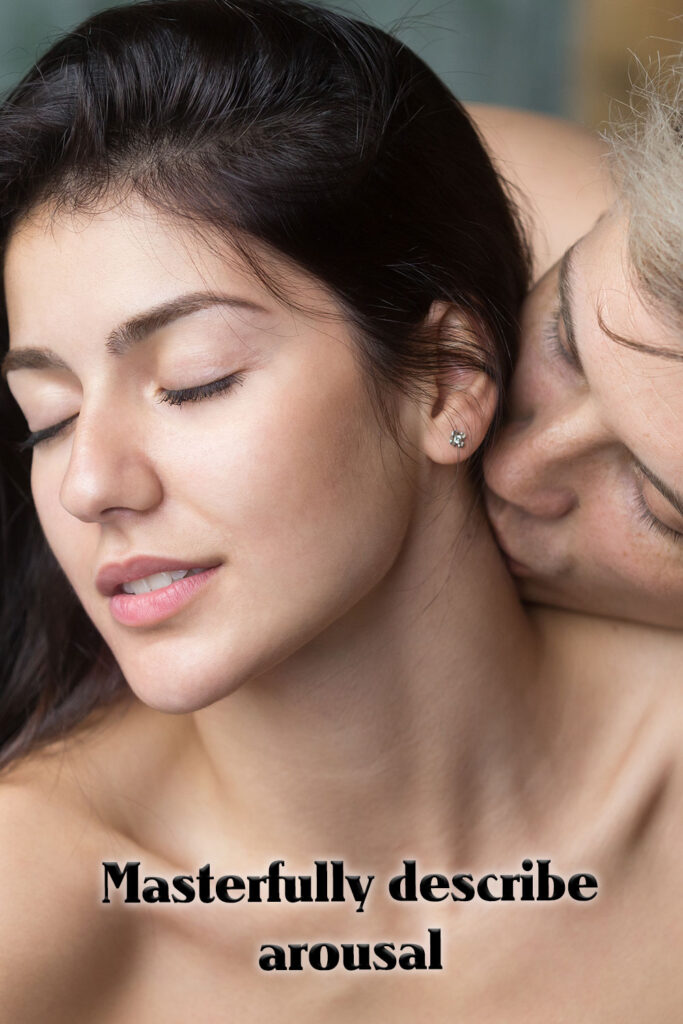As an erotica writer, it’s important to understand the physical, mental, and emotional responses that accompany arousal in order to create characters and scenes that feel authentic and true to life. Arousal can be triggered by a number of factors, including physical touch, communication, visual stimuli, and more. In this blog post, we’ll go over the different physical cues, mental reactions, emotions, and cognitive responses that come with arousal so you can write engaging and effective stories.
Triggering sexual arousal
There are a variety of trigger stimuli that can cause sexual arousal in people. However, individual preferences and tastes can vary from person to person. Here are three specific trigger stimuli for sexual arousal:
- Physical touch: Physical touch can be a powerful trigger for sexual arousal. This can include intimate touching by a partner as well as self-touching. Sensitive areas such as the genitals, breasts, lips, or other erogenous zones can be sexually aroused by touch.
- Sensual stimuli: Sensual stimuli such as visual stimuli, smells, or sounds can stimulate sexual arousal. Looking at attractive people, watching erotic pictures or movies, smelling perfume or pheromones, erotic music, or suggestive conversations can trigger sexual arousal.
- Erotic fantasies and thoughts: Erotic fantasies and thoughts can also cause sexual arousal. Individual fantasies and thoughts can be strongly arousing and help increase sexual arousal. This can be done in fantasy alone or by sharing erotic thoughts with a partner.
Bodily responses to arousal
A variety of physical reactions occur during sexual arousal. These reactions are similar in both men and women, although there may be some gender differences. Here are some of the typical physical reactions that may occur during arousal:
- Cardiovascular changes: The heartbeat speeds up, blood pressure rises, and blood vessels dilate. This leads to better blood flow to the body and especially to the sexual organs.
- Genital Reactions: In men, sexual arousal causes the penis to become erect. This occurs when the blood vessels in the penis dilate and more blood flows into the erectile tissue. In women, there is increased blood flow to the labia, clitoris and vagina. The labia may become enlarged and the clitoris may swell.
- Muscle tension: During arousal, muscle tension increases throughout the body. This especially affects the muscles in the pelvic area and thighs.
- Breathing changes: Breathing speeds up during sexual arousal. This can lead to faster and deeper breathing.
- Skin changes: The skin may become red or hot to the touch during arousal. This is due to increased blood flow to the skin.
- Glandular secretion: During arousal, various glands in the body may be activated. In men, for example, prostatic fluid is produced, while in women, the Bartholin glands can secrete secretions. The sweat glands can also become more active.
The physical reactions of arousal can vary from individual to individual. Not everyone experiences all of the above reactions in the same way or intensity. In addition, factors such as stress, fatigue, or certain medical conditions can affect physical arousal.
Psychological reactions to arousal
The psychological reactions of sexual arousal are closely related to physical reactions and may vary from person to person. Here are some of the most common psychological reactions that may occur during arousal:
- Lust and desire: Sexual arousal is often accompanied by an increased feeling of pleasure and sexual desire. There is a desire for sexual activity and intimacy.
- Attention and Focus: During sexual arousal, attention is directed more toward sexually relevant stimuli and sensations. Thoughts may focus on erotic fantasies or sexual imaginings.
- Feelings of relaxation or euphoria: Sexual arousal can trigger feelings of relaxation and euphoria. Endorphins and other chemical messengers in the brain can contribute to a pleasurable and lustful feeling.
- Changes in emotional state: During sexual arousal, emotional states may increase. This may be expressed as an increased feeling of happiness, an increased sensitivity to closeness and intimacy, or a more intense sense of connection with the partner.
- Concentration and blocking out other stimuli: In an aroused state, it is common to focus on sexual stimuli and the current sexual experience. Other environmental stimuli are often less noticed or pushed into the background.
Psychological reactions of sexual arousal can be influenced by various factors, such as individual personality, one’s own experiences, and the current situation. It is also possible for psychological reactions such as fear, shame, or insecurity to influence sexual arousal. Each person has his or her own unique psychological reactions to sexual arousal.
Emotions during sexual arousal
During arousal, various emotions can occur that are closely related to physical and psychological responses. Emotions during arousal may vary from person to person, depending on individual preferences, experiences, and the specific situation. Here are some of the emotions associated with sexual arousal:
- Lust: Lust is one of the basic emotions associated with sexual arousal. It is a strong desire for sexual gratification and physical intimacy.
- Desire: Desire refers to the desire for a particular person or sexual act. It can express intense attraction and a desire for sexual fulfillment.
- Joy: Sexual arousal can be accompanied by a deep sense of pleasure and satisfaction. It can evoke a positive and uplifting sense of fulfillment.
- Passion: Passion is an intense emotion that can be associated with sexual arousal. It is a fire of passion that fuels sexual energy and desire for sexual experience.
- Ecstasy: Ecstasy is an intense emotional state characterized by a sense of being overwhelmed and out of one’s mind. It may occur during the peak of sexual arousal and be accompanied by a feeling of absolute surrender.
- Connectedness: Sexual arousal can also increase feelings of connectedness and intimacy with a partner. It can emphasize the need for closeness, trust, and emotional connection.
Emotions during sexual arousal are strongly influenced by individual differences and cultural influences. People experience a wide range of emotions beyond those listed above. These can vary depending on specific circumstances and individual personalities.
Cognitive responses to arousal
Cognitive responses to arousal refer to the thoughts, perceptions, and cognitive processes that may occur during sexual arousal. These responses can vary from person to person and may depend on individual preferences, experiences, and the specific situation. Here are some of the cognitive responses that may be associated with sexual arousal:
- Erotic fantasies: Sexually oriented thoughts and fantasies may occur during arousal. These fantasies may serve to heighten sexual arousal and increase sexual desire.
- Concentration on sexual stimuli: In an aroused state, attention may be focused more on sexually relevant stimuli. These may be visual stimuli, auditory stimuli, or thoughts of past sexual experiences.
- Cognitive distortions: During sexual arousal, cognitive distortions may occur in which the perception of sexual stimuli or experiences becomes distorted. This can lead to increased awareness of positive aspects and decreased awareness or devaluation of negative aspects.
- Increased sensuality: Sexual arousal can lead to an increased awareness of sensory impressions. Touches, smells, tastes, and visual stimuli may be perceived more intensely, enhancing the sexual experience.
- Self-reflection: During sexual arousal, there may be increased self-reflection. Thoughts about one’s sexual desire, preferences, desires, and sexual performance may surface.
- Changes in sense of time: In an aroused state, the sense of time may be altered. The perception of time may slow down or speed up as attention is strongly focused on the present moment and the sexual experience.
Cognitive responses to sexual arousal vary individually and are influenced by several factors, including one’s personality, sexual experiences, and current situation. In addition, personal beliefs, societal norms, and cultural influences may also play a role.
Arousal is a complex and multidimensional experience that involves a range of physical, mental, emotional, and cognitive responses. As an erotica writer, if you understand these different aspects of arousal, you can create more realistic and believable characters, develop more exciting scenes, and write stories that truly engage your readers. By incorporating these elements into your writing, you can create compelling characters and scenes that evoke strong emotions and provide a truly engaging reading experience.



